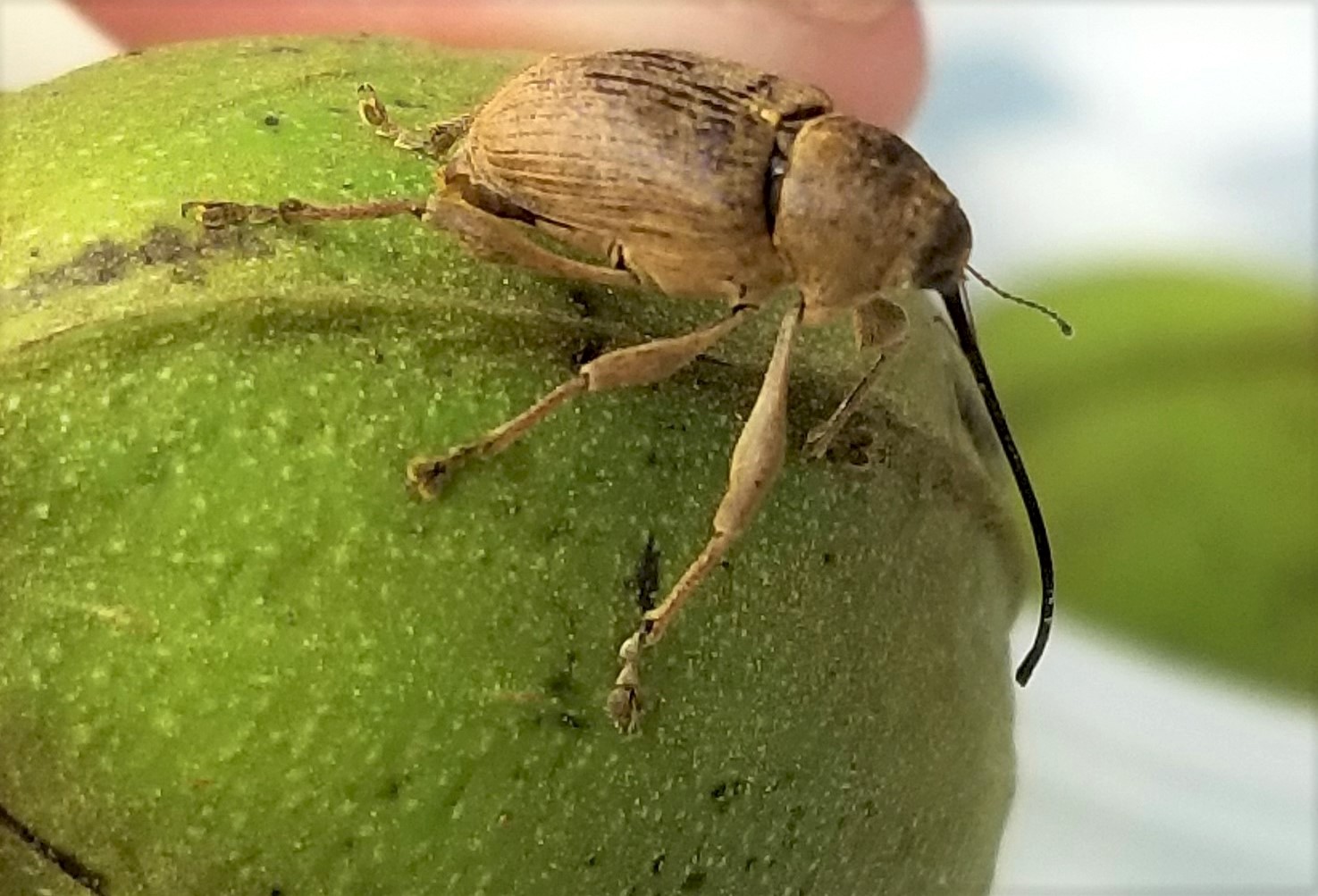Pecan Weevil Quarantines—Don’t Forget!

Adult pecan weevil female. (Photo by Tiffany Johnson)
As the West’s pecan production and processing continues to expand, so does the risk of introducing pecan weevil into primary western growing areas (far West Texas, New Mexico, Arizona and California, and northern Chihuahua). As part of an ongoing commitment to prevent the spread of invasive pecan pests, growers, equipment dealers, commercial pruners, pecan buyers, and other industry members must remember quarantines that are in place that restrict the movement of inshell pecans, equipment, and related items from pecan weevil infested areas.
Some general guidelines to remember:
- Quarantines restrict the movement of pecan-related regulated articles. In general, these regulated articles are defined as inshell pecans, pecan husks and shells, pecan trees with attached soil and/or fruit, and any items related to harvesting, hulling, dehydrating, shelling, transporting, or storing of pecans or pecan-related debris. These items may include but are not limited to: sacks, boxes, equipment, machinery, and vehicles. Please refer to each state’s quarantine in question for a concise list of articles covered by their regulation.
- Quarantines must be followed for every state that a regulated shipment travels through to its final destination. For example, a load of inshell pecans coming from Oklahoma passing through Texas that is destined for New Mexico must meet Texas state regulations as well as New Mexico’s regulations.
- In general, inshell pecans and other regulated articles originating from a regulated state and/or county must be treated to destroy pecan weevil when traveling west into a non-infested pecan growing region. This treatment must be performed in the state of origin and documented on a phytosanitary certificate issued by a state department of agriculture official. Accepted treatments can vary between states.
- Contact your state’s department of agriculture before shipping any pecan-related regulated articles across state lines/quarantined regions. They will be able to assist you with the required paperwork and treatments to legally transport your load to its final destination. Important information to have available would be the address where the article originated from, a description of the items contained in the load, and the address of where the load will be delivered. This information will assist in determining what treatments and paperwork will be required.
New Mexico, far West Texas, Arizona, California, and northern Chihuahua have their own specific quarantines in place that restrict the movement of inshell pecans, equipment, and related items from pecan weevil infested areas. The following quarantines and regulations are specifically associated with New Mexico:
- The Pecan Weevil Exterior Quarantine restricts the movement of pecan-regulated articles into New Mexico from all eastern pecan growing states, except for El Paso and Hudspeth counties in Texas. This regulation means any restricted articles originating from quarantined states/areas must be accompanied by a certificate of treatment, which is also issued by the state department of agriculture in the state from which the load/article originated. Any restricted articles entering New Mexico not included in the quarantine must be accompanied by a certificate of origin issued by the state department of agriculture in the state from which the load/article originated.
- The Pecan Weevil Interior Quarantine restricts the movement of pecan-regulated articles from quarantined counties in New Mexico. The current counties under quarantine are Eddy, Lea, and Chaves. Regulated items leaving quarantined counties must be accompanied by a certificate of treatment issued by the New Mexico Department of Agriculture (NMDA). Transportation of regulated items in enclosed trailers may be moved from quarantined counties directly into a treatment facility outside the quarantine area only if previously approved by NMDA as indicated by a current signed compliance agreement.
- Approved Treatments: There are currently two approved treatment methods for the transportation of regulated articles into or within New Mexico. The first is a cold treatment in an approved cold storage container/facility at or below 0 degrees Fahrenheit for seven consecutive days. The second is an immersion in hot water (140 degrees Fahrenheit for five consecutive minutes).
For further information on New Mexico’s pecan weevil quarantines and certification process, please call the NMDA Entomology & Nurseries Section at (575) 646-3207, or visit us online at www.nmda.nmsu.edu. With continued collaboration between the pecan industry and state agencies, we can be successful at keeping Western pecan orchards free of pecan weevil.
Editor’s note: Pecan buyers in New Mexico must also be licensed as required by the New Mexico Pecan Buyers Licensure Act. A pecan buyers license application and a list of licensed pecan buyers may be found here.

